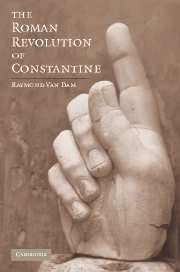Book contents
- Frontmatter
- Contents
- PREFACE
- ABBREVIATIONS
- Map
- Introduction: AUGUSTUS AND CONSTANTINE
- SECTION I A ROMAN EMPIRE WITHOUT ROME
- SECTION II A GREEK ROMAN EMPIRE
- SECTION III EMPEROR AND GOD
- 9 “BEGOTTEN OF THE GODS”: THE IMPERIAL TETRARCHY
- 10 “BEGOTTEN FROM THE FATHER”: THE CHRISTIAN TRINITY
- 11 “ONLY-BEGOTTEN SON”: HISTORY BECOMES THEOLOGY
- 12 THE SEARCH FOR THE CHRISTIAN DOCTRINE OF THE EMPEROR
- Epilogue: ONE EMPEROR
- APPENDIX 1 HISPELLUM: DATE, TEXT, AND TRANSLATION
- APPENDIX 2 ORCISTUS: DATES, TEXT, AND TRANSLATION
- EDITIONS AND TRANSLATIONS
- BIBLIOGRAPHY
- INDEX
10 - “BEGOTTEN FROM THE FATHER”: THE CHRISTIAN TRINITY
Published online by Cambridge University Press: 05 June 2012
- Frontmatter
- Contents
- PREFACE
- ABBREVIATIONS
- Map
- Introduction: AUGUSTUS AND CONSTANTINE
- SECTION I A ROMAN EMPIRE WITHOUT ROME
- SECTION II A GREEK ROMAN EMPIRE
- SECTION III EMPEROR AND GOD
- 9 “BEGOTTEN OF THE GODS”: THE IMPERIAL TETRARCHY
- 10 “BEGOTTEN FROM THE FATHER”: THE CHRISTIAN TRINITY
- 11 “ONLY-BEGOTTEN SON”: HISTORY BECOMES THEOLOGY
- 12 THE SEARCH FOR THE CHRISTIAN DOCTRINE OF THE EMPEROR
- Epilogue: ONE EMPEROR
- APPENDIX 1 HISPELLUM: DATE, TEXT, AND TRANSLATION
- APPENDIX 2 ORCISTUS: DATES, TEXT, AND TRANSLATION
- EDITIONS AND TRANSLATIONS
- BIBLIOGRAPHY
- INDEX
Summary
During the early fourth century the teachings of Arius and like-minded theologians offered many attractive qualities. These theologians were careful interpreters of Scripture, and they respectfully used numerous biblical citations and allusions to support their doctrines about the essential subordination of Jesus Christ the Son to God the Father. They argued that God's preexistent Logos and Sophia, “Word” and “Wisdom,” were not merely divine attributes but had been embodied as a distinct divine entity, the Son. They invoked the authority of earlier distinguished theologians. They engaged with the concepts of classical philosophers. They were concerned about the practical concerns of ordinary believers and defined appropriate doctrines of soteriology and ecclesiology. With its appeals to the Bible, tradition, reason, and discipleship, Arian theology would have made a perfectly respectable orthodox Christianity. In retrospect, modern historians of doctrine would have seen its enshrinement as orthodoxy as a logical, even necessary, outcome of the theological trends of early Christianity.
Instead, Arianism ended up reviled as thoroughly heterodox, “the prince of heresies.” The council of Nicaea in 325 accepted the fundamental coordination of God and Jesus Christ; it also set the tone of vicious antagonism by supplementing its creed with anathemas that pointedly detonated Arius' teachings. Despite this hostility, Arian and neo-Arian doctrines nevertheless survived and even flourished. During the mid-fourth century Arianizing bishops were more successful at acquiring imperial patronage, including the support of Constantine, Constantius, and Valens, and for a time Arianizing theology (in the guise of Homoian Arian doctrines) seemed on the verge of success.
- Type
- Chapter
- Information
- The Roman Revolution of Constantine , pp. 252 - 282Publisher: Cambridge University PressPrint publication year: 2007

